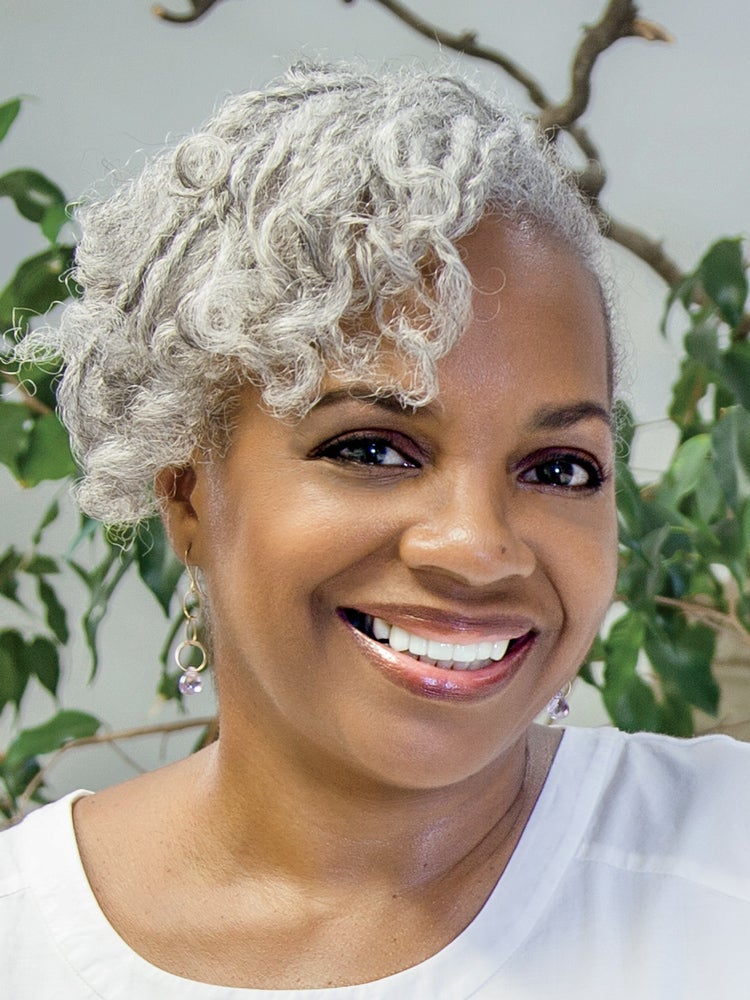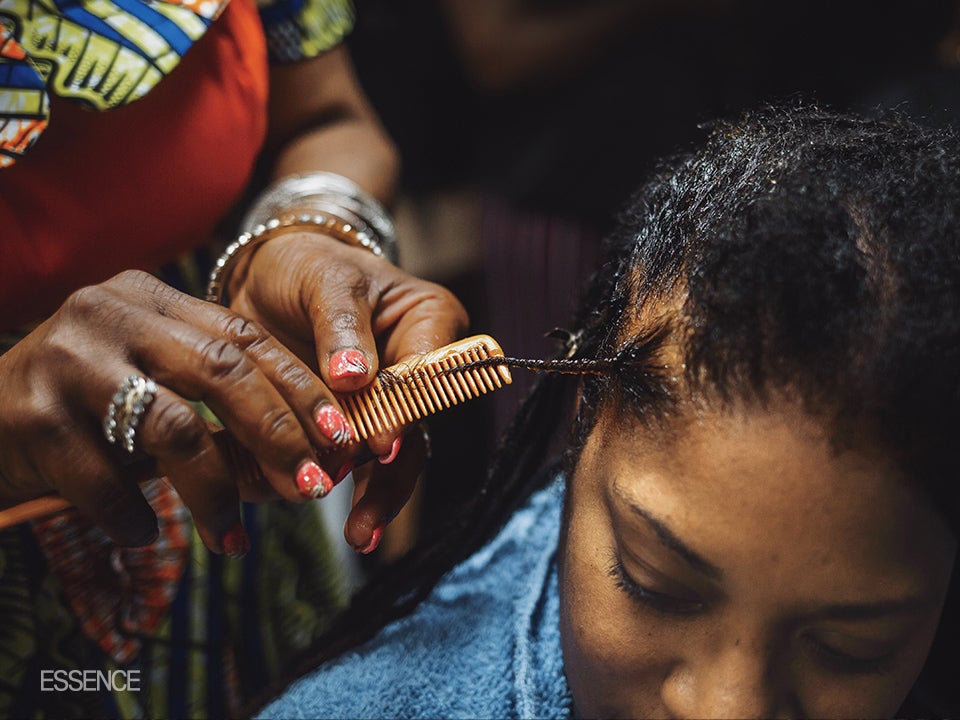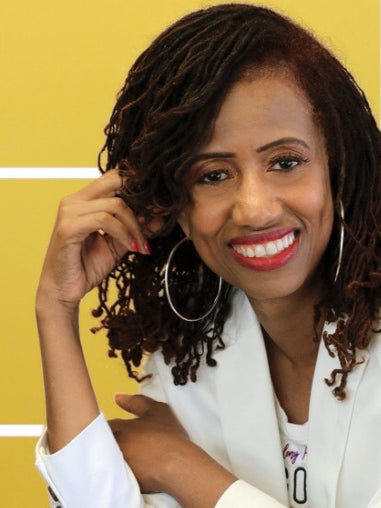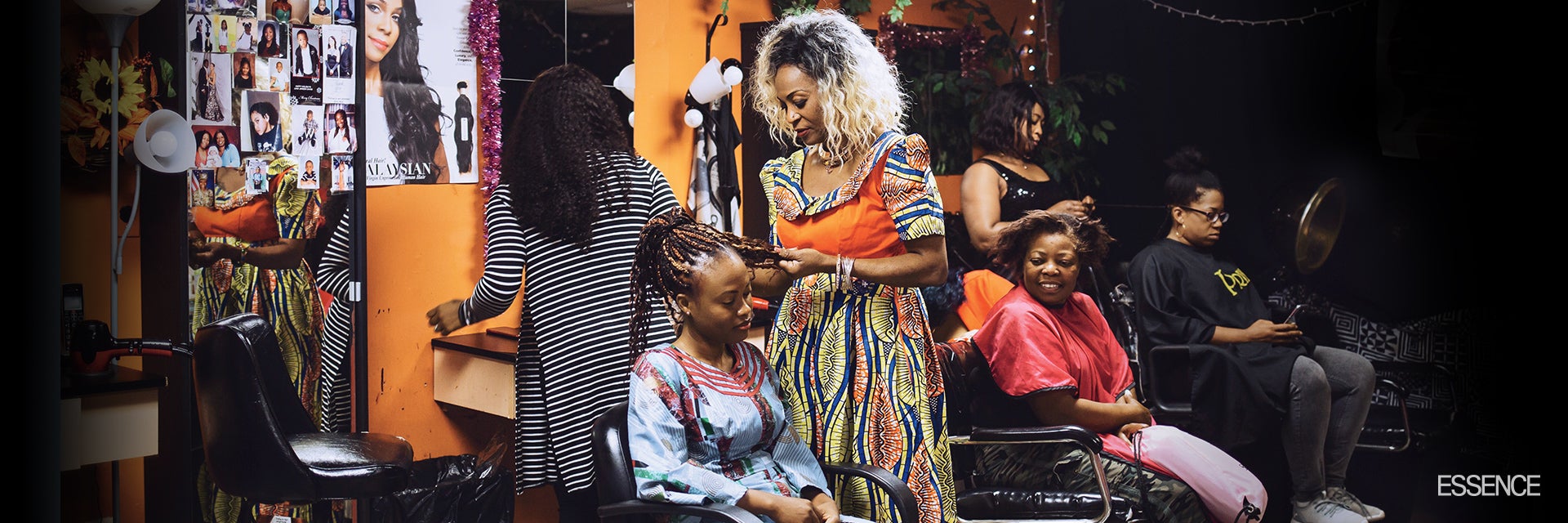Throughout the United States, many of those who move nimble fingers through the textured strands of Black hair have been in an ongoing battle to practice their craft freely. Though the tradition of hair braiding predates the arrival of Africans on American shores, legislation from New Jersey to Nevada has threatened the profession.
Today, largely due to the unwavering efforts of Black women and the attorneys and advocates who believe in their cause, states whose licensing requirements once involved hours of unnecessary and expensive beauty school instruction have replaced their heavy-handed demands with less intrusive government regulations. And yet the fight is not over. “Forcing someone to go to cosmetology school for a year, to spend upwards of $20,000 to learn something you’re not going to do, is overly burdensome,” asserts Pamela Ferrell, co-owner of D.C.’s Cornrows & Co.

The longtime entrepreneur took up natural hairstyling as a career in the late seventies after being fired from her job for wearing braids. Today she considers herself a pioneer in the natural hair care field and lends her voice to a growing movement that is focused on removing unreasonable licensing requirements for natural hair braiders. Around 1982, just two years after Ferrell opened her salon with husband Taalib-Din Uqdah, the couple found themselves in a legal battle with the district’s Department of Consumer and Regulatory Affairs. In a move that Ferrell views as an attempt to “stop competition, they were told to shut down their business because they lacked the proper training and permissions to operate. Ferrell and Uqdah disagreed, and their defiance sparked a decade-long campaign of what they considered to be “constant harassment.”
The repeated threats of closure, citations, and fines came to an end only after the two decided to sue the District of Columbia, requesting that their business be granted a limited license. With help from the Institute for Justice (IJ), a public interest law firm, they prevailed, winning the right for braiders in the nation’s capital to operate based on a specialty natural hair license that is different from those regularly issued by cosmetology schools.
This led to a significant reduction in the hours of impractical instruction that failed to include a hair braiding component, as well as a decrease in the overall price of training. D.C.’s compromise predates New Jersey’s very similar decision in 2018 to curtail a 1,200-hour curriculum that costs $17,000 in favor of a 40-to-50- hour specialty license for those making a living as hairdressers for natural styles. “There is no reason hair braiders should be required to spend thousands of dollars and thousands of hours on coursework completely unrelated to what they have been given a gift to do,” says Assemblywoman Angela V. McKnight (D), cosponsor of the Garden State’s successful hair braiding bill. “This just doesn’t add up, and it presents a barrier to business ownership for many African-American and African immigrant women who earn a living for their families [by] braiding hair.”
McKnight and her cosponsors, Assemblywoman Shanique Speight (D) and Assemblyman Arthur Barclay (D), worked with hair braiders across the state to make the measure possible. They enlisted the help of Black women like Brigitte Nzali, who, upon relocating from France to the United States, identified a need in her community and brought the natural hair braiding customs of her native Cameroon to the suburbs of South Jersey. “When I moved here with my family, there were no braiding salons in the area,” recalls the owner of African & American Braidings in Blackwood. “As a businessperson, I realized that a lot of [potential] customers, especially African-Americans, had to go all the way to New York City, Philadelphia or even Maryland just to have their hair braided. So I decided to open a salon that specialized in cultural hairstyles, because I grew up braiding.”

Nzali, much like Ferrell, was met with opposition soon after her salon doors opened in 2001. The pushback moved her to become an advocate for less stringent regulations. “I wrote to everybody,” Nzali says. “I wrote to the governor, I wrote to the lieutenant governor, I wrote to the state board and the attorney general. I said, ‘I want to help.’ ” Eventually, the burgeoning entrepreneur was able to voice her concerns to then New Jersey governor Chris Christie at a breakfast for minority business owners. Although nothing happened immediately, she continued writing letters.
A few years later Nzali was able to testify in front of the state’s Red Tape Review Commission, a group of lawmakers and private-sector members tasked with studying New Jersey regulation. Thereafter she appeared before a committee of New Jersey legislators, and her testimony helped frame what would become the state’s newly adopted hair braiding law. At that hearing Nzali was joined by an activist from IJ, the same law firm that helped Ferrell and her husband win their case in D.C. years earlier.
There is no reason hair braiders should spend thousands of dollars and thousands of hours on coursework unrelated to what they have been given a gift to do.
– ANGELA V. MCKNIGHT
IJ has been engaged in a 25-year-plus collaboration with natural hair braiders across the nation who argue their right to practice safe, chemical-free styling without red tape rigamarole often placed on them as professionals. Currently 43 states and the District of Columbia either have no license requirements or a license specific to those who craft these styles. Attorneys and activists from the firm have successfully pushed for a change in cosmetology laws for hairstylists who create natural looks in 22 of those states. “Most of the cosmetology laws, especially at the time we first started challenging them, were quite old,” notes Paul Avelar, managing attorney at IJ’s Arizona office. “D.C.’s cosmetology laws had been adopted in 1938 and hadn’t really been amended since then. Whether it was racism or ignorance, I doubt very much that the people in D.C. in 1938 were thinking a lot about natural hair.”
Avelar has seen many similar situations while fighting on behalf of braiders, including women and men who use their hands and simple tools to create locs, twists and sew-in extensions without cutting hair or using dangerous chemicals. Often the state legislation predates the recognition of natural hair braiding as a profession. This was the case in Mississippi, where Melony Armstrong runs Naturally Speaking, a Tupelo-based salon that specializes in sisterlocs, twists and other natural styles. Back when she first had the idea to start her business, she called the state’s Board of Cosmetology to determine the next steps in getting it off the ground.

That’s when she was told that in order to practice professionally, she would have to obtain a cosmetology license. “I just thought, Okay, I’m going to learn a lot about hair,” Armstrong remembers. But when she dug deeper into what the curriculum actually entailed, she realized hair braiding was not included. After consulting with an attorney, she reluctantly decided to sue the state of Mississippi. “I’m trying to have a business,” she recalls. “I’m just trying to make an honest living, and now I’m having to sue people, and not just sue people but sue state agencies.
I remember thinking, I’m not even originally from this state, and I’m coming in, and I’m making trouble.” By 2005, the good trouble Armstrong created paved the way for Mississippi to differentiate natural hair braiding from cosmetology, removing the need for braiders to obtain a specific license to run their business. If Avelar and Ferrell had it their way, all 50 states and D.C. would adopt a similar stance. What is especially concerning to them are the obstacles that still exist for braiders trying to comply with state laws. Despite Ferrell’s lawsuit, there’s a lack of schools offering natural styling classes, and D.C. still requires braiders to complete 100 hours of training in addition to renewing their licenses every two years.
In Illinois, New York, and North Carolina, that prerequisite is 300 hours. Ohio can be up to 450. Avelar notes that in Nevada, where 250 hours of training is required, there has never been a school that offers the curriculum. And currently IJ is suing Louisiana, a 500-hour state, because their specialty license is nearly impossible to obtain. Even so, economic liberty advocates remain committed to fighting until all braiders are free from burdensome regulation. For them, dark hands weaving through the kinks and coils atop the heads of melanin-rich women is not just a matter of business. It’s an innate right. And for the braiders twisting their way to financial security one customer at a time, the American dream will be realized.
